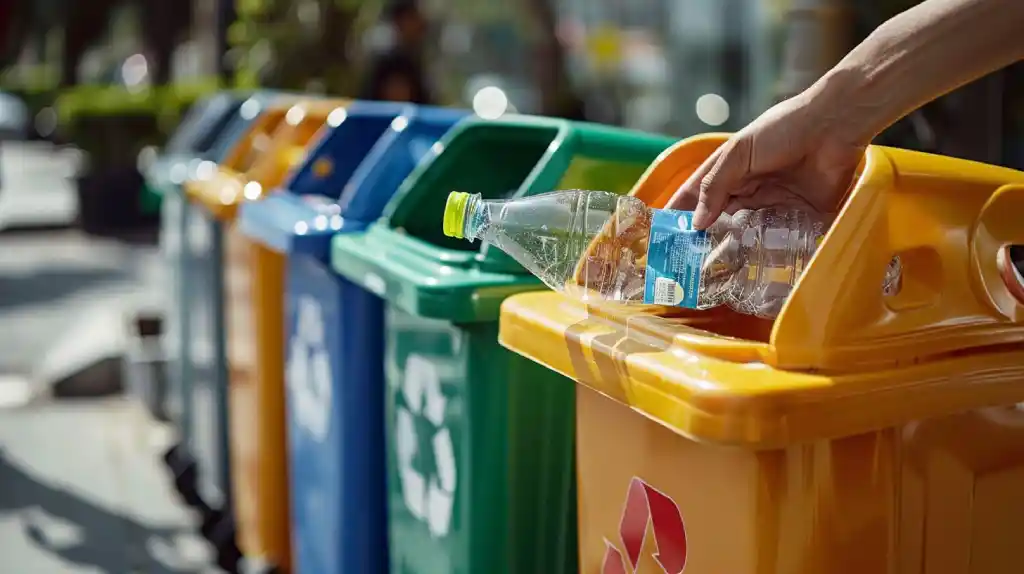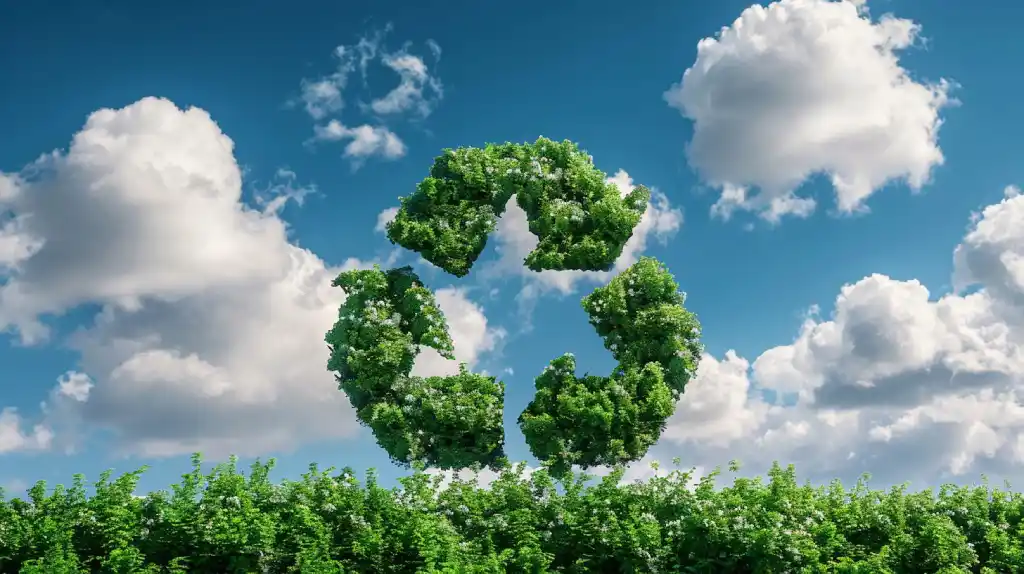Recycling is reusing old stuff to make new things. It helps save the environment by reducing waste and using less new materials.
Recycling can turn your trash into treasure and give everyday items a whole new life. But what is recycling exactly, and why is it so important?
In this ultimate guide to recycling, we’ll discover what is recycling and everything you need to know about it, from recycle definition and meaning to practical tips on what and how to recycle and incorporate it into your daily life.
Recycling helps build a more sustainable future by greatly reducing waste and conserving natural resources.
What is Recycling

Recycling is the process of converting waste materials into new products. It converts discarded items into fresh, usable products.
Recycling conserves resources by reducing the need for new raw materials and helps protect the environment by reducing waste and pollution.
It is the innovative process of converting waste materials into new materials and products, that would otherwise be discarded as waste.
This environmentally friendly practice lowers the volume of litter in landfills and also reduces pollution levels and the production of harmful substances.
Recycling is an important part of sustainable living because it helps the community, the economy, and the environment.
Recycle Definition

Defining Recycle and its Significance
Definition of recycle is the act of converting waste into something that can be used again. It gives things new life and gets them ready to be used again.
This process involves breaking down materials into their basic components and then making new things out of these recycled materials.
Recycling recovers and repurpose valuable materials, helps fight climate change and it also contributes preserve the environment.
Recycle Meaning
Recycle meaning is to process used materials to produce materials that can be used again. It is a crucial aspect of sustainable living and responsible resource management.
Ultimately, the meaning of recycling lies in making a healthier and greener planet for all living beings.
The Process of Recycling
Recycling involves several steps to transform waste materials into new products effectively. The process typically includes:
1. Collection and Transportation:
This is the first step where recyclable materials are gathered from homes, companies, and recycling facilities.
2. Sorting:
Once at the recycling facility, the collected materials are sorted into different categories such as paper, plastics, metals, and glass.
3. Cleaning:
The materials are cleaned to remove any contaminants. Processing: Cleaned materials are then processed and turned into raw materials.
4. Manufacturing:
The recycled raw materials are then sent to manufacturers where they are converted into new products.
5. Resale:
Finally, these newly manufactured products are packaged, distributed, and then sold to consumers.
How to Recycle

To begin recycling, the first step is to familiarize yourself with your local recycling guidelines to know, how to recycle and what can be recycled.
Recycling Basics
- Check local guidelines: Understand what materials can be recycled in your area.
- Separate recyclables: Keep paper, cardboard, glass, aluminum, and plastics separate from regular trash.
- Clean containers: Rinse food and liquid residue from bottles and cans.
- Avoid bagging: Place recyclables directly into the bin.
- Prevent contamination: Don’t mix non-recyclables with recyclables.
- Use designated bins: Place clean recyclables in appropriate recycling containers.
By following these rules, you know how to recycle properly and help reduce waste and conserve resources.
How Can You Recycle

Recycling is easy and it can be easily incorporated into our daily lives.
Start by setting up designated recycling bins in your home or workplace for different types of recyclable materials. This will make sorting and separating easier.
Check your local recycling guidelines and basic rules. This helps you know that how do you recycle.
Recycling Simple
Simplifying the Recycling Process for Beginners
Recycling may seem overwhelming at first, but it can be broken down into simple steps.
First, understand what materials are accepted for recycling in your area and start separating them.
Next, make sure to clean and properly prepare the recyclables before placing them in the designated bins or bags.
Lastly, set out your recyclables on collection day.
You have successfully recycled.
What Can You Recycle

Common Recyclables
- Paper and Cardboard: Newspapers, magazines, office paper, cardboard boxes
- Plastics: Bottles, containers, jars (check recycling symbol)
- Metals: Aluminum cans, beverage cans, tin cans, foil
- Glass: Bottles and jars (check local guidelines)
Note: Always check local recycling programs for specific guidelines to better know what you can recycle.
Trash Guidelines
When it comes to recycling, following the correct guidelines makes sure how to recycle and what can be recycled, so that your efforts contribute positively to the environment.
- Know your recyclables:
- Understand what materials can be recycled in your area.
- Check if trash bags are recyclable.
- Check if ziploc bags are recyclable.
- Check if bubble wrap is recyclable.
- Check if egg cartons are recyclable.
- Separate recyclables: Keep paper, cardboard, glass, aluminum, and plastics separate from regular trash.
- Clean containers: Rinse food and liquid residue from bottles and cans.
- Avoid contamination: Keep recyclables clean and free from non-recyclable materials.
- Use designated bins: Place recyclables in the appropriate recycling containers.
Recycling Electronics (E-waste)
- E-waste: Understand how to dispose of electronic devices responsibly.
- Avoid landfill disposal: Improperly discarded computers contribute to e-waste in landfills.
- Recycle electronics: Use designated e-waste recycling programs.
- Data privacy: Securely erase personal information before recycling electronic devices.
Trash vs Recycling - Know the Difference
Trash is non-recyclable waste that cannot be reused.
Recyclables are materials that can be processed into new products.
Proper waste management is crucial for successful recycling. By correctly sorting and disposing of waste, we prevent contamination and make sure recyclable materials can be processed efficiently, reducing landfill waste.
Waste Management and the 3 R’s
- Proper waste management is essential for a clean environment.
- Reduce, reuse, and recycle to minimize waste.
- Dispose of waste responsibly.
What Can Be Recycled

List of Recyclable Items
Exploring a Broader Range of Things you can Recycle
- Electronics: Many electronic devices contain recyclable materials.
- Batteries: Both rechargeable and single-use batteries can be recycled.
- Organic waste: Composting food and yard waste reduces landfill waste and creates nutrient-rich soil.
- Kitchenware: Metal and certain plastic kitchen items might be recyclable.
- Clothing and textiles: These can be recycled or repurposed.
- Cosmetic containers: Often recyclable after cleaning.
- Hard plastics: Includes items beyond bottles and containers.
- Garden waste: Can be composted.
- Light bulbs: Certain types, like CFLs and LEDs, are recyclable.
- Construction materials: Many building materials can be recycled.
- Automotive parts: Several vehicle components are recyclable.
Recycling Symbols
- Mobius Loop: Indicates an item is recyclable.
- Resin Identification Codes: Numbers in a triangle on plastic, identifying the plastic type.
- Green Dot: Shows the manufacturer contributes to packaging recycling in Europe (not recyclability guarantee).
- Compostable: Means the product can biodegrade in industrial composting conditions.
- Paper Recycling Symbols: Indicate the product is made from recycled paper and can often be recycled.
These symbols help consumers recycle correctly.
Simple Recycling Tips for Everyday Life
- Reduce waste: Use reusable items instead of single-use plastics.
- Support recycling: Buy products made from recycled materials.
- Recycle right: Know what to recycle and how to prepare items.
- Pick up trash: Help keep our environment clean and prevent waste from entering the recycling stream.
- Repurpose items: Find new uses for old things before discarding.
- Spread the word: Educate others about recycling and waste reduction.
Benefits of Recycling

- Conserves natural resources: Reduces the need for raw materials, protecting forests, mines, and other natural habitats.
- Reduces air pollution: By reducing greenhouse gas emissions from landfills and the energy-intensive process of producing new materials.
- Helps precious biodiversity: Reduces deforestation and habitat destruction caused by resource extraction.
- Promotes sustainable technology: Drives innovation in recycling processes and the development of recycled materials.
- Protects water resources: Prevents pollution of rivers and waterways with harmful chemicals and debris, and further protecting aquatic environment.
- Reduces littering and waste: Reduces the amount of trash accumulating in our environment.
- Reduces environmental impact: Recycling lessens our ecological footprint.
- Promotes sustainable living: By promoting sustainability, resource conservation and reducing environmental footprint.
- Safeguards wildlife: By preserving habitats and preventing harm from waste-related dangers.
FAQ's
1. What is recycling in simple words?
Recycling is the process of converting waste materials into new materials and objects.
2. How to recycle
To recycle, materials should be sorted into designated bins for paper, glass, plastic, and metal.
3. Why is recycling important?
Recycling is important for protecting the environment and conserving resources. It reduces waste, saves energy, and lessens pollution.
4. How do we recycle waste?
Waste is recycled by collecting, sorting, processing, and changing it into new products.




